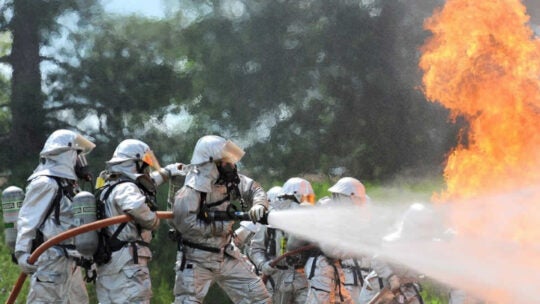
Every organization will have to put out a fire, whether it’s managing a leadership scandal or a global pandemic. Either way, when extinguishing a fire, you must train your crisis response team to think like those who do it daily—firefighters. They are crisis experts, and their best practices are tried and tested over a long period.
Firefighters experience crises of all kinds, and, as in PR, not every one is a full-blown crisis. From house fires to car accidents, firefighters control situations promptly, but not recklessly, and formulate effective responses.
Similarly, communicators can prepare for crisis and less-threatening issues. The firefighting tactics below can help your team quell even the most formidable media firestorm.
Training is Vital
For a firefighter, effective, consistent and continuous training is a matter of life and death. One mistake can result in terrible consequences.
We know what you’re thinking. ‘Firefighters train for life-and-death situations. They face them regularly. It’s not the same in PR, where life-and-death scenarios are rare.’
True. Yet in spite of their reverence for training, firefighters are like everyone else. They not only combat fires, they must battle complacency.
Similar to people in all sectors, including PR, some firefighters find training a struggle at times. Yes, they understand its importance, yet training can seem like a disruption. ‘Is it really necessary to do this again? Now?’
In addition, some teams and individuals, in firefighting and PR, may feel satisfied with the status quo. This can lead to a decreased desire to continue training. Fight that desire.
What to Practice
Similar to firefighting brigades, crisis teams should have an action plan. All members should know and train for their responsibilities.
While firefighting plans contain specific duties for each member, they allow for contingencies. No PR crisis is exactly like another. Same for fires. Tweaks in firefighting plans are necessary. Similarly, PR crisis-response plans are specific, yet flexible enough to adapt to a scenario.
Still, having team members designated for roles during a PR crisis will establish a well-organized response and can prevent lots of headaches.
The Team
A PR crisis team should include, at minimum, a director to oversee the response, key executives, a spokesperson, legal counsel, specialists in media relations and PR and subject-matter experts.
Rapid Coordination is Key
During a blaze, every moment counts, and firefighters are trained to respond within minutes. When operating on the scene, firefighters are expected to take decisive action quickly.
In most fire scenarios, there is a lot of noise and problems occurring simultaneously. Being able to block out distractions and focusing on coordinating an effective response through clear communication and coordination are essential. Teamwork and effective guidance from chiefs and line officers make all the difference when coordinating a response.
Just as firefighters look to chiefs and other line officers, crisis response teams must coordinate with their leaders. Frequent communication, consistent feedback and a specific plan will facilitate effective coordination.
Mistakes occur when a team’s members are not in tune with each other, and it is up to leaders to be able to organize through the chaos.
‘Everyone Goes Home’
A firefighting adage is, “Everyone goes home.” It means that no matter how the fire was handled, everyone got out safely and returned home with valuable lessons learned.
A critical part of this effort occurs after a response, once the crew is back at the firehouse. Firefighters always have a debriefing to listen and talk about what didn’t go well and where the team can improve. This is a valuable opportunity for crew members to leave their feelings at the door and get to the root cause of any issue(s).
Failure happens in PR, too, of course, and communicators must learn from mistakes. Ensure that after every crisis, staff gather to discuss issues, achievements and opportunities for improvement.
The fire environment always changes and traditional methods have evolved into more effective practices. Similarly, PR crises evolve. Still, emulating the firefighter’s approach your organization can ensure its crisis response remains effective and adaptable.
Mike Marinella is a volunteer firefighter and a communicator at ROKK Solutions
